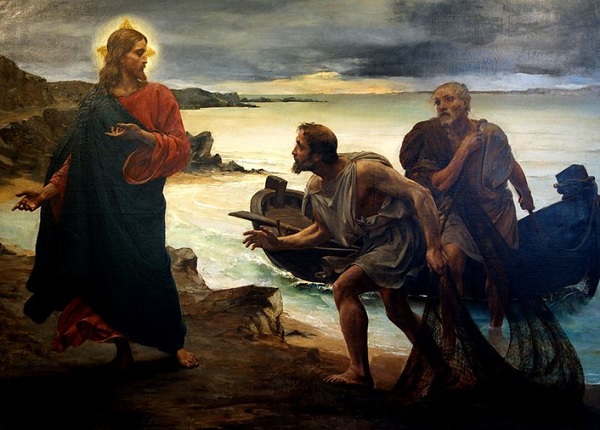‘And leaving everything, they followed him’
26 September 2022Today’s Gospel reading tells us how the fishermen of Galilee specifically and in practice denied themselves and their own affairs, followed Christ and became his disciples and apostles.
Our Lord was at Lake Gennesaret, and on the bank he saw two boats, from which some fishermen had disembarked and were now washing their nets. The Lord stepped onto the boat of Simon and began teaching the people. After the Word had preached, he told Simon to cast the nets into the water, but the latter expressed his annoyance. They’d spent hours fishing that day and their labors had been in vain. The Lord insisted, however, and Simon’s compliance was rewarded with a catch of fish so large that the boat was in danger of sinking. Their reason was an impediment; their experience told them to say no. How was it possible to cast their nets in broad daylight? Their exhaustion was a cause of complaint; having been awake all night made them protest. But they set all that knowledge, annoyance, experience, tiredness and exhaustion to one side. They overcame it. They transcended it.

When Peter saw this extraordinary and unexpected shoal of fish, he fell on his knees and said: ‘Get off my boat and leave me, Lord. I’m a sinner and not worthy to have you on my boat’. The Lord calmed him, however, and said: ‘Don’t be afraid. From now on, you’ll be netting people who you’ll bring to salvation through your preaching’. Then when all the fishermen had brought the boats back to land they left everything and followed him.
The astonished Apostle Peter realized through the blessing of the miracle that it was no ordinary person before him, but a unique teacher with divine power. When he felt the Lord’s majesty, he was unable to gaze on Jesus’ face. Absolutely in awe, he bent the knee of his soul and body and venerated him. He felt his sinfulness and the majesty of the sanctity of the Teacher.
The people of the sea, the fishermen, were called to continue the task of his mission. Christ called them to implement their experience of fishing, no longer for fish, but to become fishers with a new and higher mission: to bring people into their net. ‘From now on, you’ll be catching* people’.
Saint John Chrysostom makes a good point about the change which occurred when the fishermen became apostles. When trawlermen drag the fish out of the water, the fish die. But the disciples fished for people not to take them out of the water, but to put them into it; not to die but to mortify their former self, to arise from the waters of the baptismal font renewed, reborn, restored and sanctified.
Before Christ called them to discipleship and their missionary work, he showed them through a miracle that he who, in the end, blessed and commended their task and mission was God himself. Miraculous events, our salvation, aren’t human achievements, but are God’s grace made manifest. We are the vessels through which God’s grace acts.
The invitation given by Christ to Peter and the other disciples is also addressed to us. They abandoned everything in order to follow him. What should we do? What can we offer? What does Christ ask of us?
First of all, anything he asks isn’t for himself. It’s always for our own good. He asks us to set aside time for prayer, for church attendance, for our spiritual growth through the sacrament of repentance and confession, to devote some of the time we spend on rest and recreation to caring for and ministering to other people. He asks us to open our wallets and give of what little we have to wherever it’s needed. And finally, he asks that we give him what’s most precious to us, our heart, so that he can cleanse it and sanctify it. So that our body may become a temple of the Holy Spirit. Amen.
* The word used in the original Greek text of the Gospel is interesting. It certainly meant ‘to fish’ or ‘to catch’, but its other shades of meaning were ‘to ransom’ and ‘to catch or save a life’, which make it particularly apt in this context (Cf, in the Septuagint, Job 10, 16; Pr. 5, 22; 6, 25, 26; Hosea 5, 2) [WJL].






